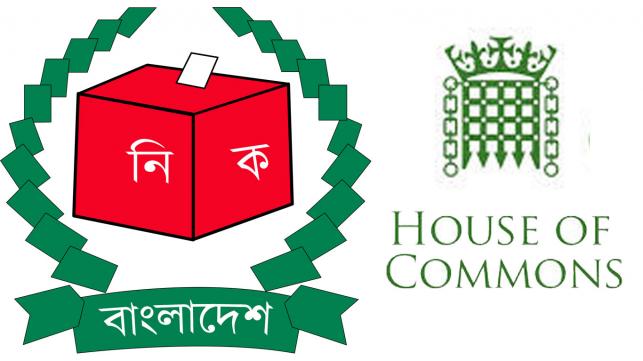A level-playing field is yet to be created in Bangladesh's parliamentary elections due on 30 December, a report presented to the House of Commons of UK parliament on Thursday observed.
“The main opposition Bangladesh Nationalist Party finally decided to contest the election. But the playing field remains far from level,” reads the report titled ‘Bangladesh: November 2018 Update’ a research briefing.
It says official harassment of the political opponents remains intense while the ruling Awami League enjoys the advantages of incumbency.
Many hundreds more of its activists have been arrested in November, the report said attributing to the BNP statements.
Despite being unable to achieve its demands to release BNP chairperson Khaleda Zia and establish a neutral caretaker administration to oversee the elections, the report quoting stakeholders poined out that the BNP’s decision to contest this time means that the 2018 elections will be more credible than many observers originally expected.
While the odds are stacked against the main opposition, it has taken actions which some analysts believe may help boost its chances - in marked contrast to the last elections in 2014 that the BNP and others boycotted, allowing the AL to establish itself in power.
There are longstanding concerns about independence of the election commission, the report said adding that electronic voting machines are being used for the first time in national elections although the BNP is opposed to it.
"Most pundits are still expecting an AL victory, but the results could be closer than previously anticipated," the report said.
Mushtaq Khan, a UK-based academic, cautioned that given the political climate since 2008, another AL victory could mean the entrenchment of single-party rule and a further slide towards political authoritarianism.
This, he argues, could undermine economic and social achievements of recent decades, which have been made possible by a political settlement in Bangladesh based on “competitive clientelism” and multi-party democracy.
The report mentioned that the degree of trust over the ‘rules of the game’ in the elections remains low.
It has also been argued that the EU’s decision not to send a full-blown observer mission illustrates international scepticism about the elections.
Instead, the EU is sending a two-person ‘expert mission’.
The Commonwealth has not yet said whether it will be sending an observer mission.
There are fears of violence and instability, during the election campaign or once the results are announced, according to the report.
The AL government has said troops will be deployed a fortnight before the elections to ensure security.
The BNP has sought to burnish its secular credentials by forming a 20-party Jatiya Oikya Front (National Unity Front), headed by Kamal Hossain, a constitutional lawyer and former minister.
Its closest political ally in the past, Jamaat-e-Islami, has been de-registered and cannot participate in the elections, although the AL claims that the BNP is doing so surreptitiously by backing other Islamist and independent candidates.
The AL heads a 14-party alliance. In something of a role-reversal, this strongly secular party has established ties with some conservative Islamist groups in recent years - most notably, Hefajat-e-Islam.
Both the main parties have said they intend to focus mainly on economic issues during the election campaign.
The AL will celebrate what it sees as a successful stewardship in terms of the country’s growth and social development. The BNP, by contrast, will argue that rampant maladministration and official corruption during the current regime has held the country back.
Critics have continued to be concerned about abuses of human rights, including misuse of criminal charges, unlawful killings and enforced ‘disappearances’.
